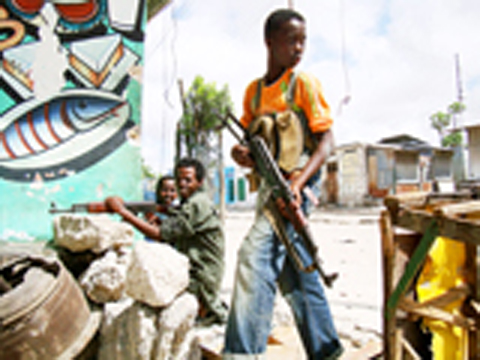Islamist rebels and Somalia’s Western-backed government and allies exchanged mortar and small arms fire on Thursday in the seventh day of clashes in Mogadishu that have killed 139 civilians.
Years of conflict in Somalia have killed tens of thousands, displaced millions more, defied 15 attempts to establish central rule and created one of the world’s worst aid crises.
“Twenty-six civilians died and 98 were injured on Wednesday and Thursday,” said Yasin Ali Gedi, vice chairman of the Mogadishu-based Elman Peace and Human Rights group.

PHOTO: AFP
“Thousands have also evacuated in this period, because fighting has spread to new districts,” he said.
The militant al-Shabaab and forces loyal to Somali President Sheikh Sharif Ahmed continued to battle in Mogadishu. Pockmarked buildings near the presidential villa shook from the latest bout of clashes, which have plagued the country since Somali dictator Mohamed Siad Barre was ousted in 1991.
Residents said African Union (AU) peacekeepers (AMISOM) shelled insurgent strongholds. Like most guerrilla wars, rebels stage hit-and-run attacks and hide among the populace.
“I saw them transporting 10 dead bodies and dozens of injured in mini-buses,” resident Abdi Hussein said. “They were all opposition, because they were masked. Government soldiers also died, but I could count only three. I’m sure there are more. We were running from the shelling of AMISOM.”
AU spokesman Barigye Ba-Hoku said: “We are neither involved in fighting nor shelling ... The opposition blames shelling on us as an excuse to attack our bases.”
Influential opposition leader Sheikh Hassan Dahir Aweys accused UN envoy Ahmedou Ould-Abdallah of trying to destroy Somalia by his support for the transitional government and dismissed any talks with Ahmed’s administration.
“It is a surprise to see Ould-Abdallah destroying Somalia when he, as a Muslim, has an obligation of being honest of what he has to do for Somalis,” Aweys said.
“The troops who came to keep Muslim leaders away from the leadership have to leave the country. [Then] we are granting every Somali that there will be no fighting. We will sit together and solve everything through dialogue,” he said.
Aid organizations warned on Thursday that Somalia’s worst fighting in months was aggravating an already dire humanitarian emergency in the Horn of Africa nation.
Once famed for its open cafes and safe streets where residents took nightly strolls — known as passagiato from the former colonial rulers, Italy — Mogadishu is now synonymous with anarchy and evokes images of militias atop battle wagons.

Eleven people, including a former minister, were arrested in Serbia on Friday over a train station disaster in which 16 people died. The concrete canopy of the newly renovated station in the northern city of Novi Sad collapsed on Nov. 1, 2024 in a disaster widely blamed on corruption and poor oversight. It sparked a wave of student-led protests and led to the resignation of then-Serbian prime minister Milos Vucevic and the fall of his government. The public prosecutor’s office in Novi Sad opened an investigation into the accident and deaths. In February, the public prosecutor’s office for organized crime opened another probe into

RISING RACISM: A Japanese group called on China to assure safety in the country, while the Chinese embassy in Tokyo urged action against a ‘surge in xenophobia’ A Japanese woman living in China was attacked and injured by a man in a subway station in Suzhou, China, Japanese media said, hours after two Chinese men were seriously injured in violence in Tokyo. The attacks on Thursday raised concern about xenophobic sentiment in China and Japan that have been blamed for assaults in both countries. It was the third attack involving Japanese living in China since last year. In the two previous cases in China, Chinese authorities have insisted they were isolated incidents. Japanese broadcaster NHK did not identify the woman injured in Suzhou by name, but, citing the Japanese

RESTRUCTURE: Myanmar’s military has ended emergency rule and announced plans for elections in December, but critics said the move aims to entrench junta control Myanmar’s military government announced on Thursday that it was ending the state of emergency declared after it seized power in 2021 and would restructure administrative bodies to prepare for the new election at the end of the year. However, the polls planned for an unspecified date in December face serious obstacles, including a civil war raging over most of the country and pledges by opponents of the military rule to derail the election because they believe it can be neither free nor fair. Under the restructuring, Myanmar’s junta chief Min Aung Hlaing is giving up two posts, but would stay at the

YELLOW SHIRTS: Many protesters were associated with pro-royalist groups that had previously supported the ouster of Paetongtarn’s father, Thaksin, in 2006 Protesters rallied on Saturday in the Thai capital to demand the resignation of court-suspended Thai Prime Minister Paetongtarn Shinawatra and in support of the armed forces following a violent border dispute with Cambodia that killed more than three dozen people and displaced more than 260,000. Gathered at Bangkok’s Victory Monument despite soaring temperatures, many sang patriotic songs and listened to speeches denouncing Paetongtarn and her father, former Thai prime minister Thaksin Shinawatra, and voiced their backing of the country’s army, which has always retained substantial power in the Southeast Asian country. Police said there were about 2,000 protesters by mid-afternoon, although